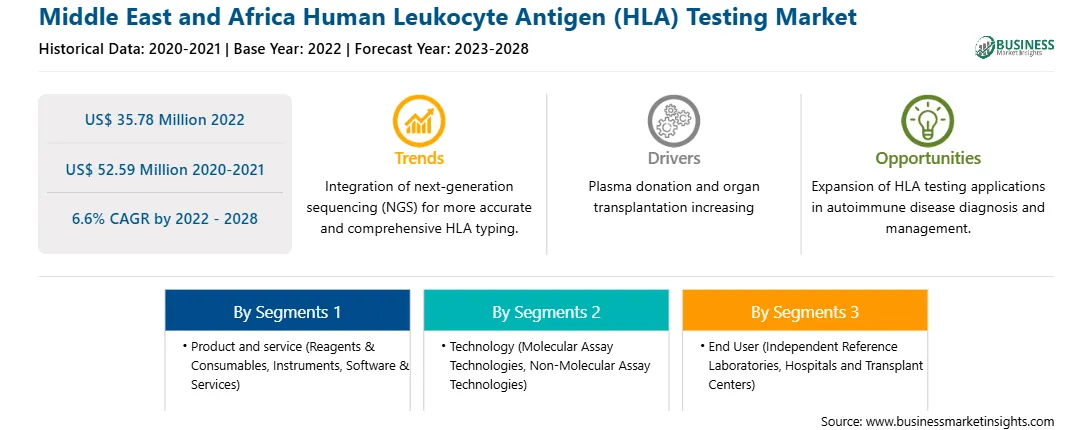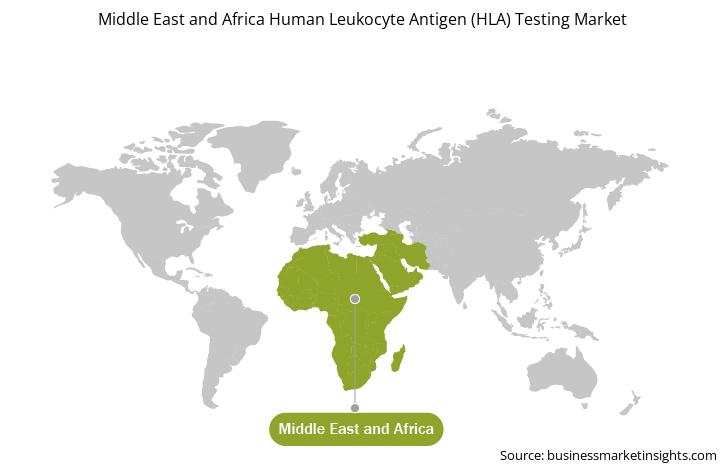Middle East and Africa Human Leukocyte Antigen (HLA) Testing Market
No. of Pages: 145 | Report Code: BMIRE00025756 | Category: Life Sciences
No. of Pages: 145 | Report Code: BMIRE00025756 | Category: Life Sciences
The Middle East & Africa human leukocyte antigen (HLA) testing market is expected to grow from US$ 35.78 million in 2022 to US$ 52.59 million by 2028; it is estimated to grow at a CAGR of 6.6% from 2022 to 2028.
Despite the development of novel technological approaches such as optimized chemotherapy regimens, targeted therapies, and radiotherapy, patients suffering from many diseases still present poor survival outcomes. Technological advancements in histocompatibility have systematically addressed the issues related to the specificity of lymphocyte cross-matching. Treating a wide range of malignant and nonmalignant diseases requires hematopoietic stem cell transplantation (HSCT) as the last therapeutic resort. The HLA testing approach can help determine if the class I and II antibodies lead to a cross-match. The information obtained from the application of such sensitive and specific technologies can be used to predict cross-match results for highly sensitized patients.
With new features and technologies, vendors can attract new customers and expand their footprints in emerging markets. This factor is likely to drive the Middle East & Africa human leukocyte antigen (HLA) testing market growth at a notable CAGR during the forecast period.
Strategic insights for the Middle East and Africa Human Leukocyte Antigen (HLA) Testing provides data-driven analysis of the industry landscape, including current trends, key players, and regional nuances. These insights offer actionable recommendations, enabling readers to differentiate themselves from competitors by identifying untapped segments or developing unique value propositions. Leveraging data analytics, these insights help industry players anticipate the market shifts, whether investors, manufacturers, or other stakeholders. A future-oriented perspective is essential, helping stakeholders anticipate market shifts and position themselves for long-term success in this dynamic region. Ultimately, effective strategic insights empower readers to make informed decisions that drive profitability and achieve their business objectives within the market. The geographic scope of the Middle East and Africa Human Leukocyte Antigen (HLA) Testing refers to the specific areas in which a business operates and competes. Understanding local distinctions, such as diverse consumer preferences (e.g., demand for specific plug types or battery backup durations), varying economic conditions, and regulatory environments, is crucial for tailoring strategies to specific markets. Businesses can expand their reach by identifying underserved areas or adapting their offerings to meet local demands. A clear market focus allows for more effective resource allocation, targeted marketing campaigns, and better positioning against local competitors, ultimately driving growth in those targeted areas.
Middle East and Africa Human Leukocyte Antigen (HLA) Testing Strategic Insights

Middle East and Africa Human Leukocyte Antigen (HLA) Testing Report Scope
Report Attribute
Details
Market size in 2022
US$ 35.78 Million
Market Size by 2028
US$ 52.59 Million
Global CAGR (2022 - 2028)
6.6%
Historical Data
2020-2021
Forecast period
2023-2028
Segments Covered
By Product and service
By Technology
By End User
Regions and Countries Covered
Middle East and Africa
Market leaders and key company profiles
Middle East and Africa Human Leukocyte Antigen (HLA) Testing Regional Insights

The Middle East & Africa human leukocyte antigen (HLA) testing market is segmented into product & services, technology, end user, and country. Based on product & services, the market is segmented into reagents & consumables, instruments, and software & services. In terms of technology, the Middle East & Africa human leukocyte antigen (HLA) testing market is divided into molecular assay technologies and non-molecular assay technologies. The molecular assay technologies segment is sub segmented into PCR-based molecular assays, sequencing-based molecular assays, and others. Based on end user, the market is divided into independent reference laboratories, hospital and transplant centers, and others. Based on country, the Middle East & Africa human leukocyte antigen (HLA) testing market is segmented into Saudi Arabia, South Africa, the UAE, and the Rest of Middle East & Africa.
THERMO FISHER SCIENTIFIC INC.; CareDx; QIAGEN; Illumina; Bio-Rad Laboratories, Inc.; F. HOFFMANN-LA ROCHE LTD.; and Takara Bio Inc. are among the major companies operating in the Middle East & Africa human leukocyte antigen (HLA) testing market.
The Middle East and Africa Human Leukocyte Antigen (HLA) Testing Market is valued at US$ 35.78 Million in 2022, it is projected to reach US$ 52.59 Million by 2028.
As per our report Middle East and Africa Human Leukocyte Antigen (HLA) Testing Market, the market size is valued at US$ 35.78 Million in 2022, projecting it to reach US$ 52.59 Million by 2028. This translates to a CAGR of approximately 6.6% during the forecast period.
The Middle East and Africa Human Leukocyte Antigen (HLA) Testing Market report typically cover these key segments-
The historic period, base year, and forecast period can vary slightly depending on the specific market research report. However, for the Middle East and Africa Human Leukocyte Antigen (HLA) Testing Market report:
The Middle East and Africa Human Leukocyte Antigen (HLA) Testing Market is populated by several key players, each contributing to its growth and innovation. Some of the major players include:
The Middle East and Africa Human Leukocyte Antigen (HLA) Testing Market report is valuable for diverse stakeholders, including:
Essentially, anyone involved in or considering involvement in the Middle East and Africa Human Leukocyte Antigen (HLA) Testing Market value chain can benefit from the information contained in a comprehensive market report.